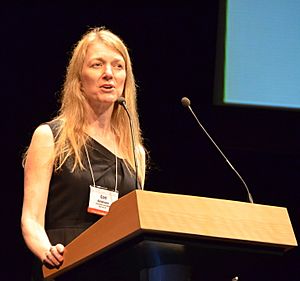Cornelia Bargmann facts for kids
Quick facts for kids
Cori Bargmann
|
|
|---|---|
 |
|
| Born |
Cornelia Isabella Bargmann
January 1, 1961 Virginia, U.S.
|
| Education | University of Georgia (BS) Massachusetts Institute of Technology (MS, PhD) |
| Known for | Olfaction research |
| Spouse(s) | Richard Axel |
| Scientific career | |
| Fields | Biochemistry Cancer systems biology Neurobiology |
| Institutions | Rockefeller University |
| Doctoral advisor | Robert Weinberg |
| Other academic advisors | H. Robert Horvitz |
Cornelia Isabella "Cori" Bargmann (born January 1, 1961) is a famous American neurobiologist. She studies how genes and brain circuits control behavior. Her main work focuses on the sense of smell in a tiny worm called C. elegans.
Dr. Bargmann has received many important awards for her discoveries. These include the $1 million Kavli Prize in 2012 and the $3 million Breakthrough Prize in Life Sciences in 2013. She was also a lead scientist at the Chan Zuckerberg Initiative from 2016 to 2022.
Contents
Early Life and Education
Growing Up in Georgia
Cori Bargmann was born in Virginia, USA, on January 1, 1961. She grew up in Athens, Georgia. Her parents were immigrants from Europe. She is one of four sisters.
Her father, Rolf Bargmann, was a statistician and computer scientist at the University of Georgia. Cori grew up playing the piano and was always surrounded by books and learning. She described her family as "frighteningly well educated."
Path to Science
Cori was inspired to study science because her older sister went to medical school. She also felt that growing up during the "space era" made her love science even more.
She went to the University of Georgia for her college studies. In 1981, she earned a degree in biochemistry. While there, she gained valuable lab experience working with scientists Wyatt Anderson and Sidney Kushner.
Graduate Studies at MIT
After college, Cori went to the MIT. She earned her Ph.D. in Biology in 1987. Her advisor was Robert Weinberg.
Her research focused on how cancer develops. She helped discover the role of a protein called Ras in bladder cancer. Her work also looked at another gene called neu. At the time, people doubted how important her research was. However, it later led to major treatments for breast cancer.
Career and Research Discoveries
Studying Worms and Smell
After her Ph.D., Dr. Bargmann did more research at MIT with H. Robert Horvitz. She began studying the sense of smell in C. elegans, a type of tiny worm. She made big discoveries, showing that these worms actually have a sense of smell.
In 1995, Dr. Bargmann became a professor at UCSF in the Anatomy department. She was promoted to full professor in 1998. She also served as a leader in her department for a short time.
Unlocking the Secrets of Smell
She continued to study how worms behave and how their brains control them. She focused on olfaction, which is the sense of smell, at a very detailed level. She looked for genes similar to those found by other scientists, Richard Axel and Linda Buck, which are important for smell and taste. She found these genes in the C. elegans genome.
Her work helped scientists understand how complex behaviors, like how animals find food, are controlled. Her research has helped us learn more about the brain, how senses work, and how neurons (brain cells) develop. Dr. Bargmann also found a special molecule called SYG-1. This molecule helps guide neurons to connect with each other as an animal grows.
Moving to Rockefeller University
In 2004, Dr. Bargmann moved to Rockefeller University. She said she wanted more freedom to focus on her research. She was also an investigator for the Howard Hughes Medical Institute until 2016. After that, she became the President of Science at the CZI.
Her lab at Rockefeller University uses the simple C. elegans worm to study how genes control brain development, function, and behavior. The worm's amazing sense of smell makes it perfect for this research.
Leadership and Recognition
Dr. Bargmann's research has earned her many honors. She was elected to the National Academy of Sciences. She also helped lead the BRAIN Initiative, a big project to understand the human brain.
She is married to Richard Axel, who is also a scientist and a Nobel Prize winner. He also studies the sense of smell.
If you want to read more about Cori Bargmann as a young scientist, you can find her in the book Natural Obsessions: The Search for the Oncogene by Natalie Angier.
Awards and Honors
Cori Bargmann has received many important awards for her scientific work:
- 1997 - Taskago Prize for her research on smell.
- 1997 - W. Alden Spencer Award for neuroscience research.
- 2002 - Became a Fellow of the American Academy of Arts and Sciences.
- 2003 - Became a Member of the National Academy of Sciences.
- 2009 - Richard Lounsbery Award.
- 2010 - Perl-UNC Prize.
- 2012 - Kavli Prize in neuroscience.
- 2013 - Breakthrough Prize in Life Sciences for her work on how genes control brain circuits and behavior.
- 2015 - Benjamin Franklin Medal in Life Sciences.
- 2016 - Edward M. Scolnick Prize in Neuroscience.
- 2021 - Salk Medal for Research Excellence.
- 2024 - Gruber Neuroscience Prize.
See also
 In Spanish: Cornelia Bargmann para niños
In Spanish: Cornelia Bargmann para niños
 | Jessica Watkins |
 | Robert Henry Lawrence Jr. |
 | Mae Jemison |
 | Sian Proctor |
 | Guion Bluford |

